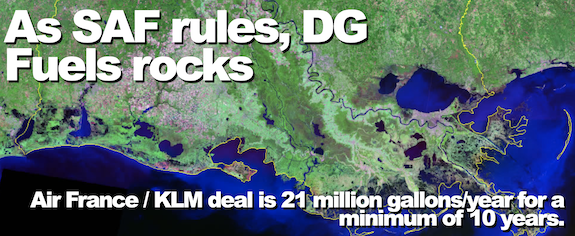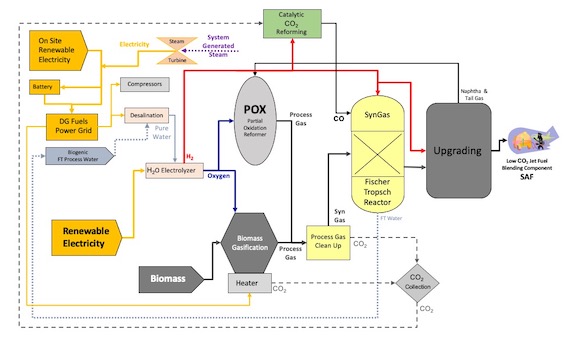As SAF rules, DG Fuels rocks with huge Air France/KLM fuels deal

News arrived on the ABLC floor that DG Fuels signed a multi-year SAF offtake agreement with Air France KLM for up to 60,408 metric tons (21 million gallons) per year from DGF’s initial plant to be located in Louisiana. Financial terms were not disclosed.
The minimum 10-year deal will reduce lifecycle emissions by up to 340,647 metric tons of carbon dioxide per year, beginning with the first expected SAF deliveries in 2026.
DG Fuels told the Digest that the contract is expected to make Air France KLM DGF’s largest European airline customer and lays the groundwork for expansion of this commercial relationship as DGF scales up production at the Louisiana and additional planned SAF production plants to be located in the United States and beyond.
In total, the definitive offtake agreement covers up to 604,086 metric tons (210 million gallons) of SAF, resulting in life cycle emission reduction of up to 3,406,470 metric tons over the initial term of the agreement. DGF’s patented system design is expected to have a carbon intensity (CI) score or -39 grams per megajoule, which is 140% lower than conventional Jet A. DGF’s SAF formula also has a higher energy density than conventional Jet A, providing airline customers with operational advantages in addition to the environmental benefits.
The DG backstory
In September, we reported that Delta and DG Fuels signed an agreement for a SAF supply stream that could provide Delta with 385 million gallons of unblended sustainable aviation fuel, while helping to expand availability of SAF in the underserved marketplace.
Anticipated to begin delivery by the end of 2027, DG Fuels is planning to deliver 55 million gallons of SAF annually for seven years. The SAF will likely use timber waste, corn stover and cotton gin waste as feedstock and is expected to reduce lifecycle greenhouse gas emission by between 75%-85% compared to conventional jet fuel, which aligns with Delta’s goal as a founding member of the First Movers Coalition. A team from FaegreDrinker led by John Kirkwood supported DG Fuels in the deal.
The First Commercial
We reported in September 2021 that DG Fuels was invited to submit a Part II Application for a loan guarantee under the U.S. Department of Energy Title XVII Loan Guarantee Program. If successful, the proposed $2.15 billion loan guarantee from the DOE would accelerate the scaling up of the proposed sustainable aviation fuel project.
The first commercial scale project is in Louisiana and is projected to have a SAF production capacity of approximately 151 million gallons per year. Black & Veatch, which has been selected to complete the engineering work, is expected to play a large role in the completion of the project going forward. It would convert 850,000 tons of dry cellulosic biomass to 3,613,000 barrels of zero CO2 life cycle emissions fuel — and overall DG Fuels has proposed 21 sites at 10,000 barrels per day.
The tech backstory
DG Fuels is building an ultra low-CO2 life cycle emissions synthetic fuel system based on its patented high carbon conversion technology that is targeting a 97% efficiency.

DGF’s method modifies the established Fischer-Tropsch system with several mechanisms that will decrease the CO2- life-cycle emissions and reduce the quantity of feedstock required. These changes eliminate the need for carbon sequestration and reduce the system’s feed-stock handling costs and complexity. Additionally, DGF’s production method produces ASTM certified direct replacement fuel with greater fuel density, lower particulate and NOx emissions.
The feedstock reduction is achieved primarily by supplementing the process with oxygen and hydrogen produced by water electrolysis units that are powered by clean wind and solar generated electricity. DGF replaces the coal gasification used by others with biomass gasification and natural gas reforming. This simplifies implementation and further reduces new carbon emissions created in the process.
DGF’s fuel production system relies entirely on cellulosic waste products like timber trimmings from the logging industry and renewable energy such as wind and solar. The DGF high carbon conversion efficiency fuel production strategy meets the highest RSB or ISSC standards of environmental fuel production. DGF’s cellulosic feedstock does not impair food supply and is essentially water neutral. Water electrolysis for green hydrogen supply is sourced mostly from byproduct water created by the rest of DGF’s fuel production process and powered by renewables.
DG Fuels’ technology produces hydrogen with water electrolysis equipment from HydrogenPro, gravity battery power balancing equipment from Energy Vault and biomass carbon derived from timber and agricultural waste via TRI gasification technology.
Black & Veatch is performing feasibility, early engineering, and environmental permitting work as well as engineering, procurement and construction.
Reaction from the stakeholders
“DG Fuels is committed to developing and supporting initiatives that provide practical and sustainable benefits to airlines around the world,” said Michael C. Darcy, Chief Executive Officer of DG Fuels. “We are proud to take this next long-term step alongside Air France KLM in supporting the lasting sustainability of our planet by reducing the impact of airline travel on the environment.”
“We have worked diligently with Air France KLM in implementing this long-term partnership,” said Christopher J. Chaput, President and CFO of DG Fuels. “With this agreement Air France and KLM now join DGF’s three other disclosed and undisclosed launch customers under binding agreements totaling over 130 million gallons per year.”
More on the story
Category: Top Stories















